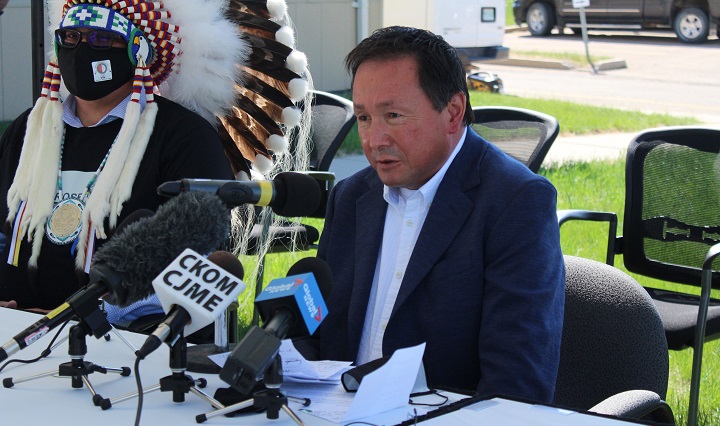The Saskatchewan government says it’s done a lot for Indigenous people in the province over the years, but one First Nation leader says a lot more work needs to be done.

On Thursday, the province issued a release saying it is proud to be a part of Canada’s national action plan released earlier in the day regarding the National Inquiry into Missing and Murdered Indigenous Women and Girls (MMIWG).
In its release, Saskatchewan highlighted all it’s done in providing resources through preventive, responsive and restorative initiatives in the areas of culture, health and wellness, human security and justice.
“Child welfare, we still have a lot of kids in care. The jails are full of our people. We are not part of the economy. We need to be part of this economy,” said Chief Reginald Bellerose of Muskowekwan First Nation.
“We don’t want to be on welfare. We want jobs. We want careers. We want opportunities.
“So, if the province is in that position, they should continue to move that partnership along and advance it so that our people can get good jobs.”
The federal government’s national action plan falls in line with the second anniversary of the inquiry’s final report and outlines Ottawa’s planned steps to address the inquiry’s sweeping 231 calls to justice.
It includes general commitments to provide funding, or enhance existing funding, toward a number of programs and initiatives in thematic areas: culture, health and wellness, human safety and security and justice.
The federal government is also pledging to invest in research and data collection to better understand the role of different social systems in preventing Indigenous involvement with the criminal justice system.

Get daily National news
A Saskatchewan response paper was also released on Thursday that provides more in-depth information on the province’s reaction to MMIWG.
Saskatchewan pointed to its efforts to create spaces that are inclusive of Indigenous cultures, including the redeveloped Prince Albert Victors Hospital and the investments made in cultural awareness training for public servants.
In January, Saskatchewan increased available funding for its First Nations and Métis Community Partnership Program to $400,000.
The program focused on initiatives related to issues raised by the National Inquiry into MMIWG in 2020-21.
“The Government of Saskatchewan is committed to pursuing meaningful, lasting reconciliation within the province,” said Don McMorris, Saskatchewan’s minister responsible for First Nations, Métis and northern affairs.
“The grants made available through the Ministry of Government Relations’ First Nations and Métis Community Partnership program supported Indigenous community organizations to educate and raise awareness on the issue of Missing and Murdered Indigenous Women and Girls and the causes of interpersonal violence in our province.”

The province also noted what it’s done to support victims of interpersonal violence and abuse by providing housing and shelter assistance, culturally informed child protection services, and education and awareness activities.
“Violence against Indigenous women and girls is unacceptable,” said Laura Ross, Saskatchewan’s minister responsible for the Status of Women Office.
“The Status of Women Office continues to work closely with internal and external stakeholders to address gender-based violence and is committed to addressing the Calls for Justice outlined in the Missing and Murdered Indigenous Women and Girls Final Report.”
The province said it’s also working on reducing the overrepresentation of Indigenous people in its criminal justice system and since 2018, has appointed five Indigenous judges, three of whom are women.
Also highlighted in its release Thursday is the work from the Saskatchewan Health Authority when it comes to initiatives in the health sector, including establishing a traditional medicine team in Regina that uses traditional healing as part of its health care.
The full national action plan and the Saskatchewan response paper can be found online.

— With files from Teresa Wright of The Canadian Press








Comments
Want to discuss? Please read our Commenting Policy first.